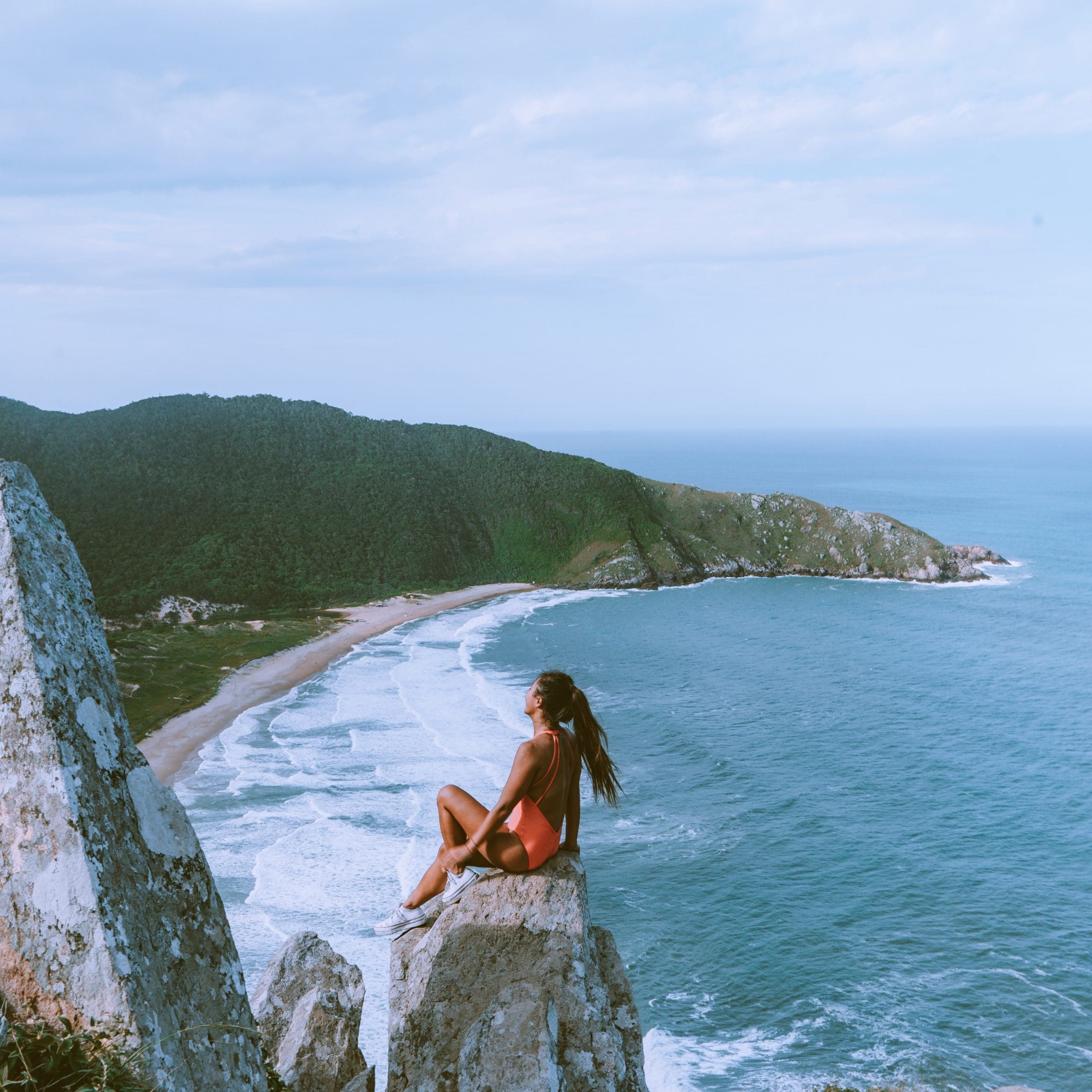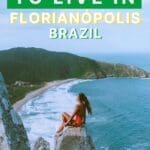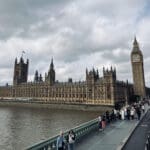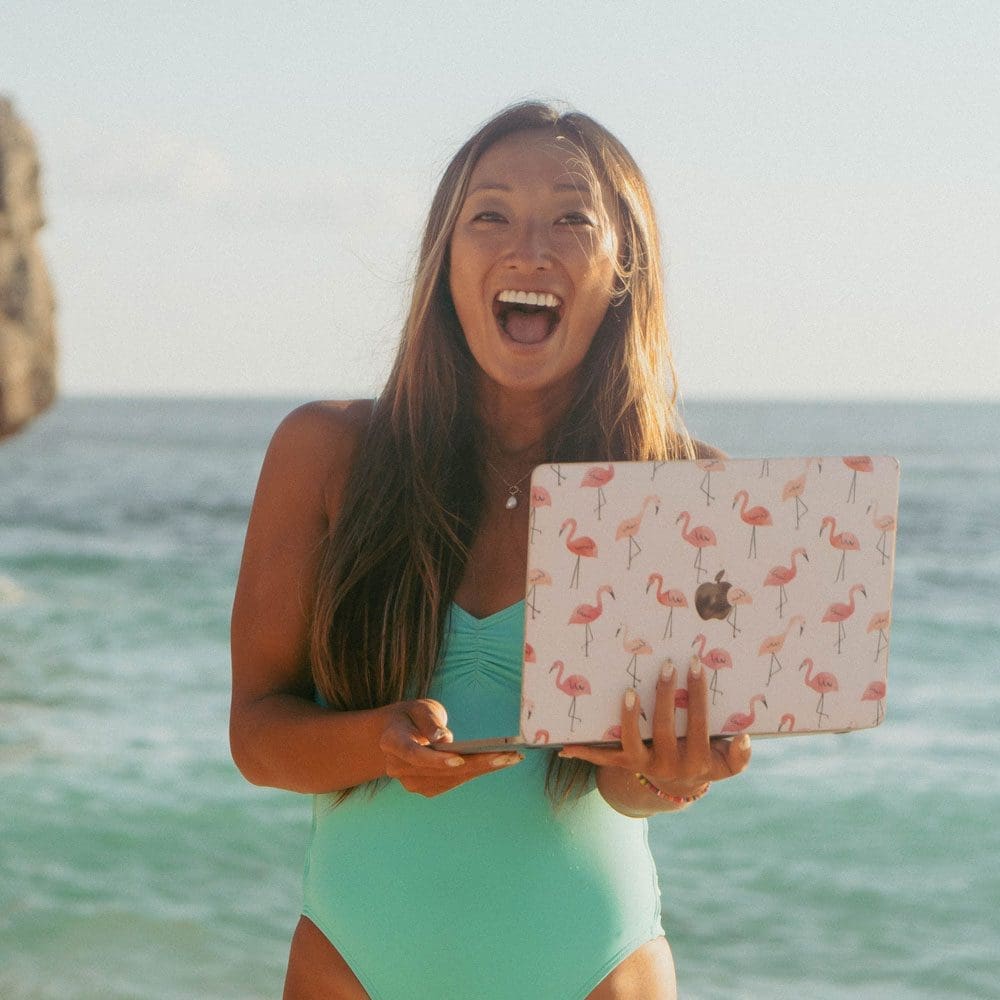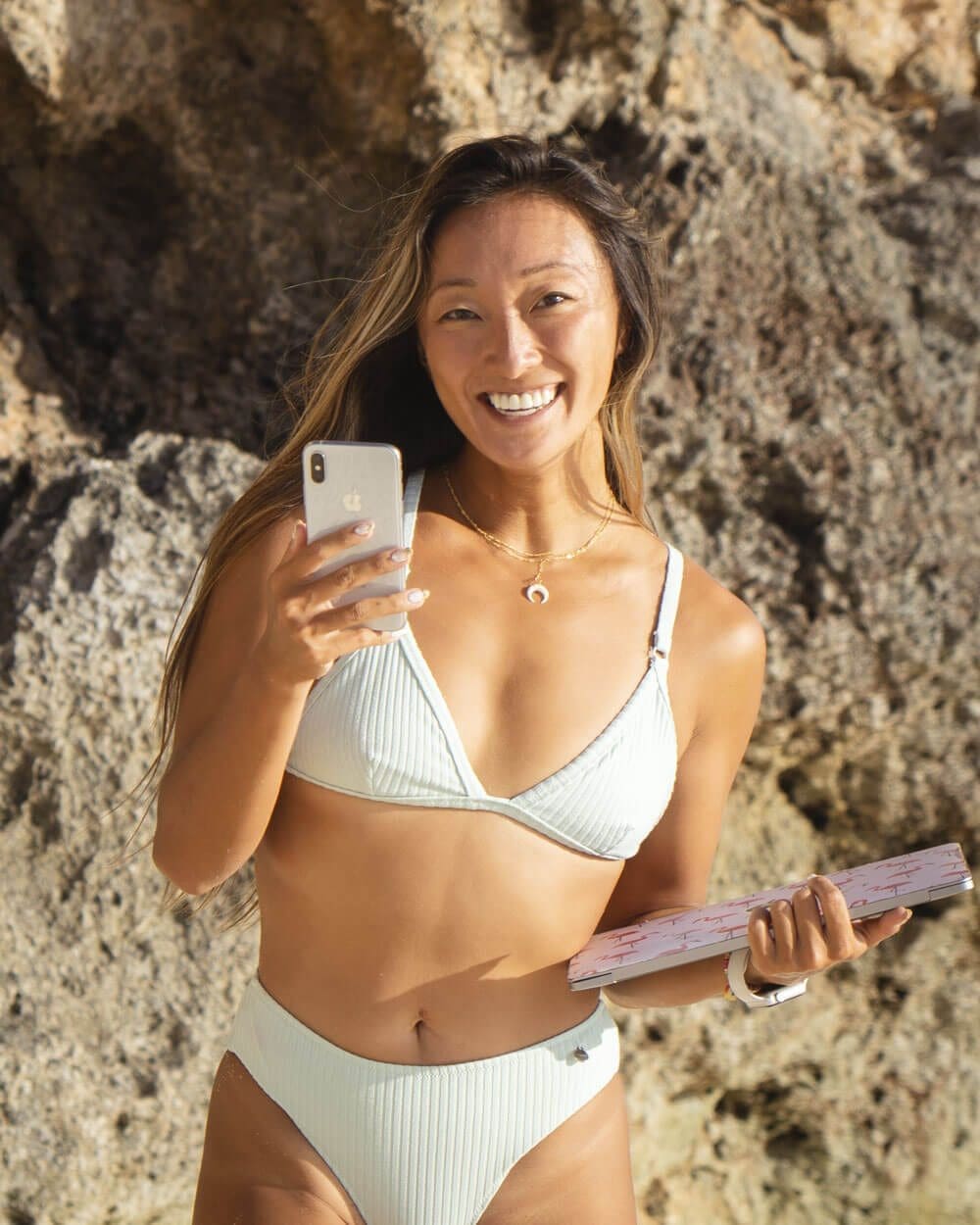Quick Links
✧ Join The Wanderlover Coaching Group
✧ Download Your FREE 0 to $100K Game Plan
Audio Transcript
(5s):
The Wanderlover Podcast was created with a mission to enable travel and freedom through entrepreneurship. I’m your host, Danielle Hu: business mentor, content creator, and founder of The Wanderlover. Tune-in every week for episodes about travel, online business, social media, and mindset that will inspire you to take massive action towards living the life of your dreams. Hello, my loves from around the world. Welcome back to The Wanderlover Podcast. And before we get started with this week’s episode of my top six lessons learned from traveling through over 60 countries, I just want to take a moment to recognize the monumental week that this is in history: to celebrate the first female black and Asian American vice-president in the white house, Kamala Harris.
(1m 2s):
This is literally a win for women everywhere breaking the glass ceiling. And I honestly could not be more happy and more proud. And I’m just so excited for all the future vice presidents and presidents that are going to be female in the United States of America. So celebrating that this week, and also some updates on Mexico. So last week’s episode was recorded before a six hour blackout. That happened on Monday. So I think in last week’s episode, we were talking about getting an office space and settling in Puerto Escondido for a little longer, but literally Monday for six hours, like with no warning whatsoever, all the wifi networks, all the data and cellular networks in all of Puerto Escondido, and its surrounding cities, went down and it was a national holiday.
(2m 0s):
It was a like, I think the day after Dia de los Muertos. And so everything was just really slow to pick back up and I was freaking out, you know, I was just so stressed. And so after that happened, I don’t think we will move forward with our plans of leasing out an office. And so right now, Ragz and I are planning to go back to New York next month. And then I guess we’ll see what to do afterwards and decide from there where to go. So that’s a little update on life, but other than that, you guys all know, you know, from my stories, I absolutely love the surf here. I love the food. I love the people. I love the weather. It is absolute paradise and we’ll definitely, definitely be back in the future.
(2m 44s):
It is a really a short and easy flight from New York City. And yeah, it’s a place we are really happy that we discovered. So carrying on with this theme of travel, let’s get started with this week’s episode. My top six lessons learned from Traveling Through Over 60 Countries. And I want to start this episode with gratitude because I know that I am very privileged to have had the opportunity to be able to plan my life out in a way where I prioritize travel. And so a few things I just want to express gratitude for. And the first and foremost, and always are my parents.
(3m 26s):
So I was actually born in Beijing, China, and my parents just made such difficult sacrifices in their life to give me these opportunities. In the United States, they were immigrants from China who lived through the cultural revolution, under a dictatorship in communist China. And they moved to a completely different country without knowing the language or the people solely for the purpose of giving me a better future. And so without their help and their sacrifices and just their endless support and love, like I would not be where I am today.
(4m 9s):
And I literally cannot think of them enough. And going off of that, I was born with a Chinese Passport. And so when my parents became American citizens, I naturally just became an American as well. And China doesn’t allow a dual citizenship. So when we got our American passports, we had to give up our Chinese ones. And American passports are so amazing. Like I think we just have so much privilege to be able to travel to so many countries with like, really not that many visa requirements. We are allowed into a majority of countries without needing to apply like three months beforehand.
(4m 50s):
And that’s something that’s so standard for people living in America, but compared to like the rest of the world, there’s so many more limitations even like compared to China. If I still had my Chinese passport, I definitely would have had more struggles and hurdles and application processes and wait times, you know, to enter other countries. And so I’m just really grateful to be an American with this passport. Also continuing on with gratitude for my parents, their endless support through my ventures, no matter how much it scares them. So growing up, like, I feel like I was raised somewhat more traditionally than later on in my life.
(5m 36s):
And as I started traveling and backpacking by myself, like, of course it’s scared my parents, you know, a lot, but they didn’t go out of their way to try to stop me. They of course tried to reason and talk me out of it, but they never controlled what I wanted to do. Even when I was like, you know, by myself in Colombia through different cities, they like had no idea what the cities were, but they knew it was like not the safest. And they still like- my poor mom… She was like, some days when you don’t text me, I won’t be able to sleep, you know, but she doesn’t tell me that until after my trip.
(6m 16s):
And just their support, you know, like I wouldn’t have been able to go to all of these countries if they really did try stopping me from going to them. And especially, I’m really grateful because I know in Chinese culture, tiger parents do exist. It’s a very different culture, right? And tiger parents are known to be super strict, very controlling, very authoritarian. And my parents were able to not be them growing up. And especially in American society where kids do have more freedom to choose what they want to do in life and more say, and just the ability, I guess, to be more free and to be more childlike and see what they want to do and follow their passions.
(7m 2s):
I’m really grateful that growing up, I had the opportunity to do the same because I do feel like if I had been controlled for a majority of my life, like I wouldn’t be as happy or know what made me happy by this point in my life. So I’m just forever grateful for all they have done. And mom and dad, if you are listening to this episode, thank you so much. And I love you guys so, so, so much. Okay. So let’s get started with this week’s episode of the Top Six lessons I’ve Learned From Traveling Through Over 60 Countries. And of course, these are all from my personal experiences.
(7m 43s):
And I do want to say that most of them are concepts that I’ve learned about life, not only lessons. So I think they’re really interesting, and I hope you guys find value. So the first thing that I’ve noticed and that I’ve learned over time is that, okay, there are far more experiences, mindsets, lifestyles, cultures, et cetera. than you can even fathom, that your mind can even like conjure up with Basically, in this world there are things that you know, there are things that, you know you don’t know, and there are things in this third bucket that are things that you don’t know you don’t know.
(8m 26s):
In my frame of knowledge, I can be like, yeah, I know like 95% of the countries I can name them like in the world. And then what I don’t know are like, I know that there’s 5% of other countries, right, out there that I don’t know. But then there are these things that you don’t know, you don’t know. And until, you know, you actually experience them or someone tells you about it or you read about it or you’re exposed to it only then you learn it. Right? And so as you travel, you just naturally come into contact with different people from different cultures and just get so exposed to this third group of things that you didn’t know that you didn’t know.
(9m 9s):
Right. Like when I went to Peru, I went to this little city called Puno to visit Lake TitiKaka. And on this Lake, there were these floating islands inhabited by the indigenous Udo people. And they basically just lived on these like floating islands made of hay or straw. I’m not entirely sure, but you know, like I literally had no idea those people existed before I took that trip. Same thing with like my dive instructor. So I visited East Timor two years ago. It’s like this country that used to be a part of Indonesia. They went through a genocide and now they’re independent.
(9m 50s):
They used to be owned by the Portuguese. And so it’s really cool. It’s this Island where they speak Portuguese, English, Indonesian, and then their like local language. And it’s just really interesting. I had no idea it existed before two years ago, but when I went there, you know, like there’s a normal people living there and normal people who have grown up there. And my dive instructor who was from France, he decided to go to East Timor because they had like the best reefs to dive in in the world apparently or so he said, and he was living amongst people who went through the genocide, right.
(10m 34s):
And this community of these expats and then these locals and this history, like I had no idea that it even existed until I went here. And there were a lot of Chinese exporters that I met on my plane there and all these people just like saw East Timor as something just so normal in their lives. And to me, I was like, Whoa, I’m learning about this new place. I’m traveling to what I thought was a completely remote place. But look at all of these people who just like see East Timor as an Island in the Caribbean. And then another example are like all my influencer and model friends from New York city and Bali who are flown to a different country every week for work.
(11m 21s):
And that’s just their job, you know, it’s so normal to them. That’s the life they signed up for and being first-class, you know, flown to a different Island to shoot bikini’s and to shoot accessories or active wear, you know? And it’s so different when you meet these people face to face and it’s their actual life. And a lot of these experiences, you know, like again with those three buckets of what you know, what you know you don’t know and what you don’t know you don’t know – a lot of it falls into the second and third category and that’s how you learn. That’s how you expand your frame of reference. Right. And that’s how you just make sense of the world around you.
(12m 4s):
And you start realizing that your world isn’t the whole world, right? Like your mindset, your experiences, your culture, it’s just a tiny fraction. And so I guess what this first lesson and concepts is is to always be curious, always be mindful that there are just, what’s the word, exponential, it’s just an extensive number of other mindsets and viewpoints of cultures than you can even fathom. So always be curious and always be aware. okay. So going off to the first lesson brings me to the second lesson of, there is no quote unquote right way to live, right?
(12m 51s):
And the first lesson, there are so many different ways of living, you know, in every part of this world, everyone lives differently. And so the only right way is what makes you happy. And I want to expand on this because I think when you travel, you pick up different aspects of other ways of living. And so finding out what actually makes you happy, it does require you to kind of expand your frame of reference and to pick up things from around the world or other ways of living that when you see it, you’re like, Oh, you know what? Like that actually would make me happy.
(13m 31s):
But maybe if someone has never traveled, you know, they wouldn’t even know because it’s something they don’t know they don’t know. So what I mean by this is when I studied abroad in Hong Kong, one of my friends from Denmark got paid by the Danish government. Every two weeks, they deposited money into his bank account for him to study abroad. His education was free and the Danish government paid him to study there, which funded his travel expenses, funded his housing, funded his like food and extra, like extra activities while studying abroad.
(14m 14s):
And there I was like paying for the same education in Hong Kong. And I’m like, what? Seriously? Right? Or when I volunteered in Kuzco for three weeks and everyone was staying for a few months and they were all like, you’re only staying for three weeks? And here I am, I like graduated a semester early, just so I could backpack by myself. And I thought three weeks was the longest I was ever going to be able to travel after I graduated, because I was signed up to go into corporate America where I would only start off with two or three weeks vacation. Right. And everyone there, like in my entire, there were maybe 10 people, everyone was incredulous that I was only staying for three weeks because that’s nowhere near enough to see the city let alone the country.
(15m 2s):
And so that expanded my frame of reference because I’m like, there are people out there who can stay here longer. And I want to be like that. But how right? Or when I found out about France’s five week minimum paid vacation time. And so learning about other countries, learning about people who are from other countries with different laws and regulations, like, had I not traveled, I would have not known that these places existed, that these were possibilities. And so once you know this as possible, Oh wait, one more example is like Germany’s pre-education system.
(15m 46s):
So I found out about this because when I was studying in Italy, I was paying Cornell semester. I was paying Cornell tuition to study in Italy, but the, my German friend was studying at the same exact university in Milan, but he didn’t pay anything. And I’m like, we’re studying at the same place. Why do I pay like tens of thousands more for the same experience. Right? So things like that, it just makes you realize that not everything is the same as what you are experiencing. And so once you know that other possibilities exist, then you always have a choice to design a life you love.
(16m 28s):
So once you know about all of these other possibilities about all of these other lifestyles, of cultures, of mindsets, of experiences, right? You always have the option to either step outside your comfort zone and take steps in the direction that you want to see your life play out in or to stay inside of your comfort zone. And so staying inside looks like going about your day to day with nothing new integrated into it. But on the other hand, if you choose to book that flight, to make that splurge, to start that side hustle, to solo travel for two years, then it’s those decisions that help you level up in life.
(17m 14s):
Are you feeling lost in your business journey and unsure of what to do and where to turn to for help? Are you getting overwhelmed with all the information on the internet? If you want to have a clear direction and action road map for the next 90 days, DM me to set up a one hour power session where we will go map, strategize, and come up with a custom business plan and marketing strategy to make the next three months the most transformational on your journey, just DM me “power call” to get started. You can find me on Instagram @TheWanderlover and I cannot wait to talk to you.
(17m 55s):
Number three lesson – media and online reports on a place are always different than real life experiences. You can read about a place as much as you want, and your experience will always, always, always be different. And you should never base your decision to go to a certain place from one person’s opinion. Like honestly, if a destination is calling your name, I strongly urge you to just go see it for yourself. You can watch documentaries. You can watch like movies and TV shows and blogs, but like, you’re never going to get the same experience if you don’t go there and see it for yourself.
(18m 37s):
And so a lot of times when media actually harms the travel industry is like, for example, when they just make something a lot more dangerous and a lot more intense, than it actually is. So for example, I was studying in Hong Kong when the 2014 protests were happening and literally on every single western media news outlet, it was photos of protesters being assaulted and tear gassed by police. And there were riots and yeah, just a lot of confrontation between day to day people and police. And what it doesn’t show is that Hong Kong is a massive, massive city.
(19m 19s):
And the protests were only going on in one part of the city, in the center part. Right. And my university was on the outskirts and we were literally like not affected at all. And so a lot of times when we see something going on in a city, right, like in Syria, the war in Syria portrayed in Western media. I once had a taxi driver in New York City who is from Syria. And I was like, Oh my God, is your country okay? Like, how’s your family? Are they in danger? You know? And he was like, honestly, most of Syria is fine. It’s just this one area that’s like really impacted.
(19m 59s):
But yeah, all of my family back home is completely fine and life is normal. And it was like, what? Really? I would have never even thought to like visit there because of what the news says. Even when coming to Mexico, o many Americans still think that Mexico is dangerous and Mexico is a huge, huge country. Like Oaxaca, where I am now, is so far from the border. It’s basically just any other tropical place in the world. Right. And if I had learned to listen to the fear-mongering or to experiences of some people in other cities in Mexico, or, you know, not like actually come here to discover it for myself, I wouldn’t have discovered it for myself.
(20m 45s):
And that’s not to say that danger doesn’t exist in this world. Like I have been in dangerous situations and none of them were forewarned. And none of them were in places that I had expected. There were, there was a time where I was like held at gunpoint, but yeah, there is danger out there, but I don’t recognize it as something that should dissuade people from going to an entire country because of what happened to me. And I do think that if you are just traveling intelligently and doing your due diligence, and if a place is calling your name, honestly, just go see it for yourself.
(21m 26s):
And to not take to everyone else’s opinion. Take it with a grain of salt. So that is my third lesson. And my fourth lesson is: Your future is now. Everything you want to do in the future, every second that passes, this new second is basically the future of two seconds ago, right? Like every single present moment you are creating your life and future. And so your future isn’t in 30 years when you retire right? Or in 10 years, when X, Y, and Z happens. Your future is so immediate.
(22m 7s):
And you have the power in every single moment to be designing a future that you are excited about. So stop waiting for one day, and literally every day start working towards an ideal future. And how I now frame my life after a lot of travel is I’m always thinking about what is the next thing I want to accomplish in terms of where I want to live and how I want to grow my business. And I realize that what I do every single day – it affects how my future comes out. And my future ends up being my past. I’m using my hands to talk a lot and you guys can’t see it.
(22m 49s):
So I don’t know if it makes sense, but your future at one point in your life ends up being your past. Right? And so I wouldn’t have been able to visit over 60 countries if you know everyday in my past, I was just like, Oh, it’s going to happen one day in the future and I’m gonna go to a bunch of countries and the flights are going to come to me when I feel like it. I’m going to just go with the flow of my day to day and not do anything out of the ordinary. And just hope that one day I’ll make it to Hawaii or the Maldives or Australia, you know, et cetera. And so in the past, too, when I was planning to go places, it would literally be every day I would be looking at different flights.
(23m 31s):
I would be looking at new experiences that I wanted to experience. And it’s through planning and through constant thinking about what I wanted to do, maybe like a week or a month or a few months into the future that ended up accumulating. So all these different mindset shifts, all of these different life experiences – they started accumulating and the number of countries went up. And so all of these things because I was very active in planning for the now, right, my future ended up being just a different definition of now, like your future is now, it’s not one day.
(24m 13s):
So if in the future you want to be fluent in French, right? What are you doing today to help you get there? Or is it well, in the future, you want to take a two week vacation to Australia. What are you doing now to either save up that money or make that time, or get that opportunity to. A lot of things you need to be doing right now in order to be creating the future that you want, and that’s how you make things happen and get shit done. Okay. Number five, as with anything in life, your travel style will also change and that’s okay.
(24m 55s):
Like life changes so fast and it’s just so unpredictable. I feel like I’ve been through like 10 different variations of myself in like the past 10 months… maybe that’s a little extreme, but maybe in like the past 10 years and that’s okay. And everything changes: your opinions change, your looks change, your travel style changes. And in terms of what makes you happy, like honestly just do whatever feels best to you and your preferences at the time. So when I first started traveling – I think my first international travel experience was when I studied abroad in Italy – I was a junior in college and I was 19 or 20 years old.
(25m 43s):
And it was my first time going to a new country by myself. I didn’t speak the language, or well, I did like three levels of Rosetta stone before I got there. So I was able to speak like conversational Italian, but it was my first time, like, going to Europe by myself. And every weekend we would take these really cheap Ryanair and EasyJet budget flights for like 20 Euro round trip to a different country and stay in these like five Euro a night, 22 dorm, like 22 people dorm rooms. So there were like 11 bunk beds in one room and it was really cheap.
(26m 24s):
There were like rats everywhere. And its just definitely not like my style anymore, but you know what, I was like a teenager and it was so much fun. And I just had so much energy and I was so excited about going to a new city and having these like crazy adventures. And I remember like one time I went to Budapest music festival to see of my favorite DJs, Carl Cox. And I had a flight back to Milan at 5:00 AM. So I literally went to the festival and stayed up all night. I was really upset because I think I had to leave at 3:00 AM and that’s when he went on stage. And so I couldn’t even see him, but I went straight from the festival to my friend’s hostel, where I like left my bag and then went straight to the airport and I was just dead.
(27m 11s):
And that was my travel style for like a few years. But now if you guys like have met me recently, I’m just completely different where I prioritize surfing, like being energized and getting my eight hours of sleep every day so that I can wake up and surf in the morning. And also like at night, just to get to bed at a reasonable time, but check out a really nice cocktail bar and just be in a really nice vibe place. I will choose that over staying up all night in a crowded room with complete strangers any time.
(27m 52s):
And I feel like going through these different chapters… And it makes me realize that it makes me less nervous about changing other aspects of my life. And it just shows how much control you have over what you do. So even when I really enjoyed just backpacking and hopping country to country a few years ago, I decided that I wanted a base and it was easy to find the base. I just decided to move to Bali. And I stayed there for more than a year. And even then for the first time I had this home outside of New York City after just country hopping. And there is also so much merit and so much to learn from that, right?
(28m 34s):
And now it’s like traveling with a partner is so different than solo travel. And that’s what I was familiar with for most of my life. So all of these new chapters, they’re always so exciting. There’s no right way to do it. You can do anything. And as you change, your travel style will change and that is completely okay. All right. So my last lesson that I’ve learned from traveling to over 60 countries, it is: We are all the same. Like on this world, every single person, we are all the same. There is no color difference, no border difference.
(29m 14s):
Like, yes, we have a lot different languages and the superficial things that make us quote unquote different because we live in a different geographical region. But no one is different. All of humanity, we have the same desires we have the same needs. And if you think about like Maslow’s hierarchy of needs, on the fundamental level, there are physiological needs. So for example, food, water, warmth, rest. And then above that are our safety needs. And then above that love and belonging. Above that esteem and above that, like the top bit is self actualization, so finding your fulfillment, finding like your purpose in this world.
(30m 1s):
And so this hierarchy of needs doesn’t apply to one country. It applies to every single person on earth. And if you think about people just having these needs, it’s on a fundamental level. You need food, water, warmth, and rest. Like, yes, some countries may be more privileged where they are able to operate where most of the people aren’t struggling for survival. But if you take away borders, if you take away passports and languages, every person has the same needs. And if you choose to stay in your bubble, right? Like what I was saying with my first lesson, there are things you know, and things you know you don’t know, and things you don’t know that you don’t know.
(30m 47s):
If you choose to say in the frame of only what you know, it will be really hard for you to see things from another person’s perspective in a different part of the world. But the more you get exposed to just different cultures, different experiences, and start opening up your world to things that you don’t know you don’t know, you start learning more about how the world as a whole operates, and you start humanizing the people who maybe previously you’ve only been able to project your opinions on based on media, right? Or based on someone else’s opinions or based on some counties’ opinions.
(31m 30s):
And you start making these divides in your head that like, Oh, the people from that country are like X, Y, and Z. Which if you think about it is just completely untrue. And I really think that the more you are exposed to that, and the more you start forming your own opinions and less on the opinions of other people or media, right? Like you really start just noticing everyone is the same. Everyone has the basic needs that get them through life. Like we can all communicate with a smile. We can all communicate happiness and sadness. If you can approach new cultures, if you can approach new people, even within the same culture, but with this understanding and what this openness and willingness to understand, I just feel like humanity, it would be so much better.
(32m 28s):
We would just treat each other like we were the same. And instead of being on a different level, like you should never look down on anyone else, right? Like there should be no levels of humanity. And I guess here is a good time to kind of confess that this last lesson of we are all the same and there should never be different hierarchies – Like, honestly, before I started traveling I did not believe this. Like when I was a teenager, I definitely thought that people who made more money, you know, deserved more privileges and they were essentially better people, you know, like better humans, but over time, you know, like, as I matured, as I just met people, as I traveled more, like all of these things, all of these projections I had about people, of other social classes, people of other countries, like I was able to break them all down.
(33m 28s):
I was able to act and live from a place of abundance, from a place of giving and serving, instead of just taking and acting with fear and traveling with fear and, you know, meeting people with the fear that they would do something to me. And this has made all the difference in how I view life and how my life has played out. I feel like when you do start to adopt a mindset like this, like you attract the people who are on the same wavelength as you. And that just is so incredibly life changing and so incredibly valuable. Okay. I have a seventh tip.
(34m 9s):
So those were my top six, but my seventh that I want to add in here, it’s nothing really like philosophical or deep, you know, it’s really, it just something that I’ve learned about myself over all of this travel…is you probably won’t end up wearing half of the outfits you pack. And so I have learned this through backpacking, where I went to like different countries in three months and had just my backpack on my back, you know? And I now travel with suitcases and checked luggage, but yeah, in my entirety of travel, I have never worn all of the outfits that I’ve packed. No matter how big or small all my suitcases have been, there has always been just extra stuff that I never have needed.
(34m 56s):
And so this tip is just to pack lighter. You know, like if there’s something you think you won’t wear, you probably won’t wear it. I think this goes more for the girls listening than the guys because Ragz is a very light packer. OK. I hope you guys enjoyed this episode. I would love to discuss anything with you guys. If you have any questions or comments, my DMs are always open. If you enjoyed this episode and you’re enjoying this podcast, please, don’t forget to rate, review and subscribe. Thank you so much for tuning in. And I will see you guys next week. Have a great week. Love you all!
~~~
If you’ve enjoyed this episode, it would mean so much if you could leave a review on Apple Podcasts. This helps us spread The Wanderlover mission to those who need a dose of inspiration today, thank you!

